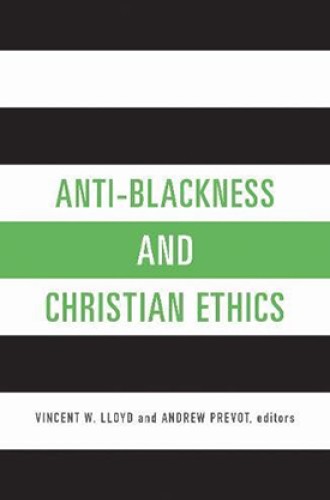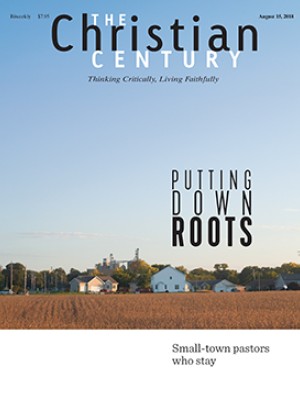Starting a conversation about anti-blackness
Christians helped create it. Can we help destroy it?
The term anti-blackness is relatively new. Some think it should replace racism and white privilege as the organizing concept for addressing the mistreatment of African Americans. For them, racism is too general and malleable, as it can be deployed to discuss any form of differential treatments based on conceptions of race. Though white privilege draws attention to the many benefits of being deemed a white person—like the reality that I don’t feel anxious when I walk by a police car—it fails to account for the horrifying treatment of those regarded as black. White privilege keeps one person from being shot by the police, but it does not explain why other individuals are far more likely to have bullet holes riddle their bodies. Anti-blackness clearly names the problem: the personal, cultural, social, legal, and structural attacks on people called black.
Following a 2016 symposium at Boston College on the subject, Vincent W. Lloyd of Villanova University and Andrew Prevot of Boston College brought together ten essays that relate ethics and theology to different facets of anti-blackness throughout American history. Most of the contributors are African Americans. Most of them emphasize Christian ethics, but the volume also contains essays by agnostics and Jews.
Read our latest issue or browse back issues.
The reasons for the collection are obvious. Month after month, anti-blackness overwhelms American society—from police killings of black men to politicians courting antiblack groups to incarceration rates that reveal bias and deep structural problems. The suffocating presence of anti-blackness is, in part, why Eric Garner’s words while being grabbed by police have become a rallying cry for many in the Black Lives Matter movement: “I can’t breathe.”
Anti-Blackness and Christian Ethics shows how American religion and Christianity have been creators, shapers, and legitimizers of anti-blackness. M. Shawn Copeland examines the place of anti-blackness in European-American Catholicism, while Eboni Marshall Turman suggests that black churches have participated subtly in furthering anti-blackness. Many of the essays emphasize the colonial period of American history, roughly 1500 to 1800. These authors focus upon the emergence of black slavery across the Atlantic and the systematic abuse of black men, women, and children in the United States as the basis for anti-blackness. This is our country’s proverbial “original sin.” According to Kelly Brown Douglas, this history “spawns a multidimensional cycle of violence against black bodies.”
Of course, American religion has never been solely on the side of anti-blackness. Lloyd and Prevot are quick to remind readers of the long tradition, especially among African Americans, of religious organizations and resources that challenged antiblack racism. The symbolic head of the civil rights movement, Martin Luther King Jr., was a minister. Activists, even Marxist ones, routinely sang Christian hymns at rallies. Churches and synagogues served as focal points for training people (and instilling the courage) to stand against the forces of white supremacy. Lloyd and Prevot hope that those rallying around the Black Lives Matter movement will turn to the resources of religious organizations, the inspiring language of religion, and the spiritual disciplines of prayer and meditation. Ultimately, Lloyd and Prevot suggest that religion is necessary for the destruction of anti-blackness because religion provides ways “of seeing the world at odds with the status quo.” Faith in “a world-transcending, world-transforming God” is needed for change.
Several essays highlight the ways anti-blackness has repackaged itself since the ages of slavery and legal segregation. Lloyd explores the writings of black power authors Eldridge Cleaver and George Jackson to show how their concept of love expanded upon Christian ethics rather than avoiding it. Elias Ortega-Aponte uses Christian ethical insights from H. Richard Niebuhr to outline ways of observing racial violence in the digital and hypermedia age.
The book’s portrayal of God may limit its appeal to some. Following James Cone, the editors claim that “God identifies with the most marginalized, those who suffer from systemic injustice.” The contributors tend to construct God along these lines as well. Stated as a fact, though, God’s identification with the most marginalized is debatable. For some Americans, the realities of anti-blackness throughout American history suggest that if God exists, then God clearly does not care about black people. This is why William Jones titled his 1973 book Is God a White Racist? For Jones, Christianity lacks the resources to challenge white supremacy. In 1963, after antiblack violence resulted in the deaths of several children in Birmingham, Alabama, the young Anne Moody explained to God she would try to kill him if she discovered he was black.
Then there are the millions of Christians who believe that God is love, that Jesus knocks on the doors of individual hearts, and that “he’s got the whole world in his hands.” These people and groups would not see God as choosing sides or aligning more with one group or another. Those who support the prosperity gospel would place God on the side of health, growth, and material gain. Those who looked to Billy Graham as a model of faith did not believe their Lord to be on the side of the oppressed, unless by oppressed one means all who suffer from sin, which in their view is all people.
By pointing to the inheritance of anti-blackness Anti-Blackness and Christian Ethics is a wonderful conversation starter. On the question of how can anti-blackness be overturned, the book has less to say. The editors acknowledge that although “the problems are clear, the solutions are often less so.” Perhaps the world-transcending God, the one who is out there somewhere, is not as needed as the people who wish to see the culture changed.







